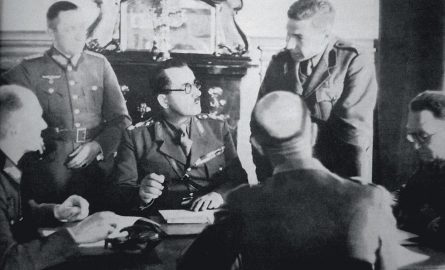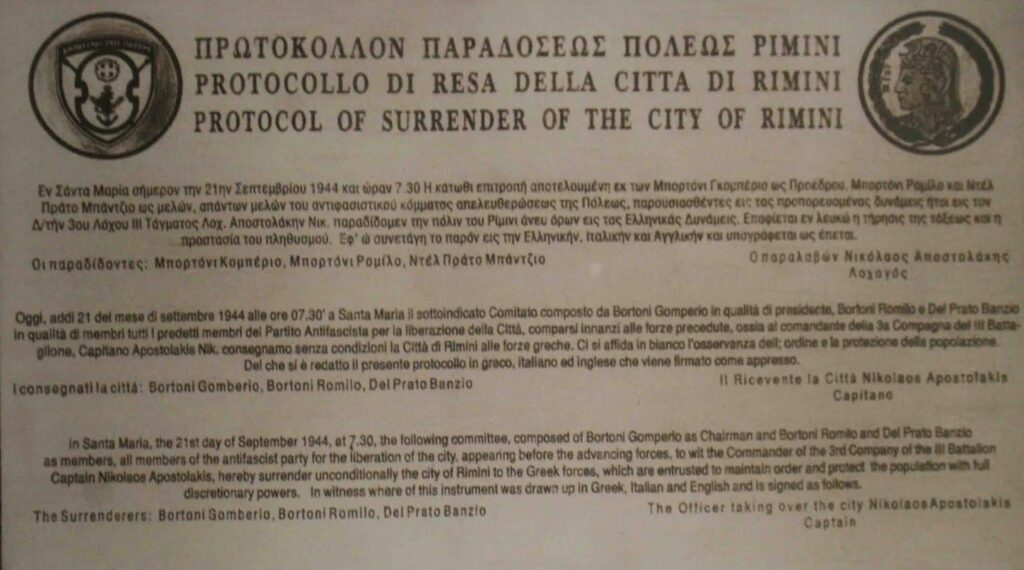By Timoleon Palaiologos,
The dawn of the 27th of April, 1941, sees the Nazi invaders occupying the Greek capital of Athens, marking the tombstone of major Greek concentrated resistance during the battle of Greece. What started as a fiasco for the Axis powers, with the failed Italian invasion of Greece in October of 1940, is now finally concluded with a triumphant parade in the Greek capital, and a Nazi flag-raising ceremony on the sacred rock of the Acropolis of Athens. And whilst the Greek resistance groups were amongst the most hardcore throughout the whole of Europe (along with their Polish and French counterparts), the tale of the heroic Greek Army ends with the occupation of Crete by the Germans on the 1st of June, 1941, — or so it would seem, but that is not the actual case.
When the Greek leadership understood that the fall of Greece was just a matter of time, chaos sparked around. After the fall of Thessaloniki on the 9th of April and the subsequent German infiltration of Greek territory, high ranking officers of the Greek Army were requesting permission from the leadership to arrange a ceasefire agreement in order to “preserve the dignity of the Greek Army”, which was about to be fully encircled and destroyed in the Epirus sector. The Greek Prime Minister at the time did not manage to get approval for such an order from the king, and so he committed suicide on the 18th of April.
Two days later, on the 20th of April, the Greek Lieutenant-General Georgios Tsolakoglou, along with fellow high ranking officers, Lieutenant-General Panagiotis Demestichas, Commander of the First Greek Army Corp, Lieutenant-General Georgios Mpakos, Commander of the Second Greek Army Corp, and the Metropolitan of the city of Ioannina Spyridon, dismissed the Commander of the Epirus Army, Ioannis Pitsikas, and signed a surrender protocol with the German commander Sepp Dietrich. The Greek government fled on the 25th of April so its members headed to Crete, and when “Operation Mercury” began, fled on the 24th to Cairo, officially forming the Greek government in Exile.

The 3rd Greek Mountain Brigade
During the stay of the Greek government in Egypt, two Greek infantry brigades were formed to reinforce the British in the Middle East. These two brigades were later disbanded due to a left LMF (National Liberation Front; ΕΑΜ in Greek, which stands for “Εθνικό Απελευθερωτικό Μέτωπο”) mutinies. The remnants of the two brigades, at least the loyal pro-monarchist soldiers and officers, formed the 3rd Greek Mountain Brigade, under Colonel Thrasyvoulos Tsakalotos on the 31st of May 1944. The 3rd Mountain Brigade consisted of three Infantry Battalions, the 3rd Regiment of Field Artillery, a Mechanic Company, a Signaling Department, a Field Surgery Department, a Reinforcement Company, a Section of Military Police, and a Logistics Support Section. On the 11th of August, the Brigade was transported from Haifa to Taranto.
The Italian Campaign on Word War II began with the allied invasion of Sicily on the 10th of July, 1943. The allies quickly stormed the Italian mainland and, on the 3rd of September, 1943, signed an armistice with the Italian leadership that was made public 5 days later, on the 8th of September. After that, every type of coordinated resistance in the Italian peninsula was made by the German Wehrmacht. Slowly but steadily, the allies pushed the Germans backward capturing important Italian cities and finally Rome on the 4th of June, 1944.

Battle of Rimini (1944)
On September the 3rd, the 3rd Regiment of Field Artillery advanced to the Metauro river and joined the Artillery formation of the I Canadian Army Corp. The plan of attack on Rimini, on the 14th of September, found the Greek Brigade under the command of the 1st Canadian Division with orders to conduct a night attack against the city, covered by the 41st Canadian Dragoon Company on their right and the 3rd Canadian Brigade on their left. The allies were encountering the 1st Parachute Division (1 Fallschirmjäger-Division in German) and the 162nd Turkestan Division. Until the 17th of September, the Greek forces had pushed the Germans and captured the airport and, on the 19th, the Greeks would focus on their major offense to capture Rimini.
According to the plan, the 2nd Battalion, Parachute Regiment would capture the east side of the city from the railway to the coast, the 3rd Battalion, 3rd Marines would capture the center part of the city, whilst the 1st Battalion, 1st Marines would bypass the city together from the west. On 07:15, 21st September, the 2nd Battalion entered the city and captured the City Hall. A few moments later, the Mayor of Rimini reported to the Commander of the II Company of the 3rd Battalion, Captain Michael Apostolakis, his intention to surrender the city of Rimini. The Surrender Protocol was written in Greek, English, and Italian, and by 09:00 Rimini was officially captured and controlled by the 3rd Greek Mountain Brigade.

During the struggle in Italy, the Greek Brigade lost 6 officers and 72 soldiers, while 19 officers and 169 soldiers were injured in combat.
References
- Εαρινή Επίθεση Ιταλών – Επική Αντίσταση του Ελληνικού Στρατού, army.gr, Available here
- Μάχη του Ρίμινι. Πώς οι άνδρες της Ελληνικής Ταξιαρχίας έκαμψαν τη γερμανική αντίσταση μετά από εννέα ημέρες. Η υπογραφή της παράδοσης έγινε και στην ελληνική γλώσσα, mixanitouxronou.gr, Available here




